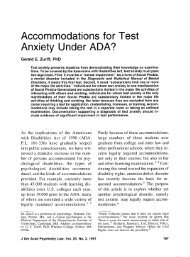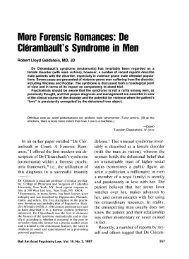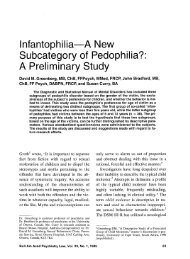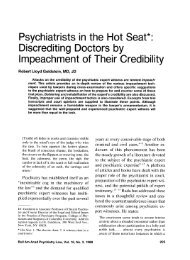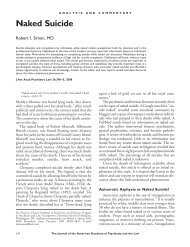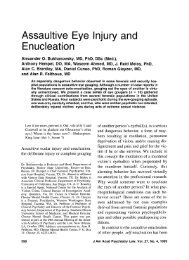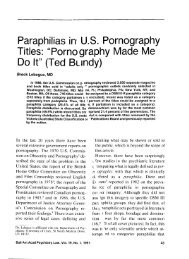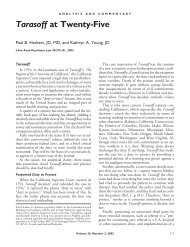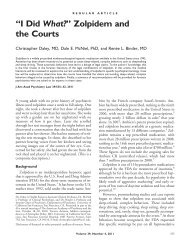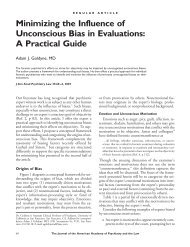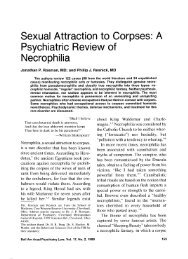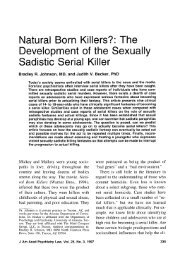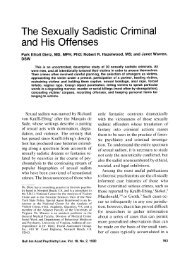involuntary Intoxication and Insanity
involuntary Intoxication and Insanity
involuntary Intoxication and Insanity
You also want an ePaper? Increase the reach of your titles
YUMPU automatically turns print PDFs into web optimized ePapers that Google loves.
The Mickey Finn Defense<br />
Case Report<br />
An off-duty police officer met a few<br />
colleagues after work <strong>and</strong> consumed two<br />
beers. Later in the evening, he stopped<br />
off at a topless bar, a known underworld<br />
haunt, for one more beer. After ordering<br />
the drink <strong>and</strong> taking a few sips, he went<br />
to the men's room. He returned to the<br />
bar <strong>and</strong> finished his drink. Within fifteen<br />
or twenty minutes, he suddenly felt as<br />
though his head was spinning. He felt<br />
hot, flushed, <strong>and</strong> dizzy. His throat was<br />
exceedingly dry <strong>and</strong> he had difficulty<br />
swallowing. His heart was beating fu-<br />
riously <strong>and</strong> his vision was blurred. He<br />
remembers staggering back from the bar,<br />
feeling that his mouth was burning, <strong>and</strong><br />
then he blacked out completely. He is<br />
amnesic for the events that followed.<br />
Other observers in the bar noted that he<br />
seemed to be confused <strong>and</strong> delirious. He<br />
staggered <strong>and</strong> strutted around the bar,<br />
shouting (at times incoherently). He<br />
yelled that he was a policeman <strong>and</strong> was<br />
going to "take care of troublemakers."<br />
He waved his gun in a menacing fashion<br />
<strong>and</strong> pointed it at several patrons, causing<br />
them to duck under tables <strong>and</strong> scramble<br />
to safety as best they could. He shot one<br />
of the patrons at point-blank range,<br />
causing serious injuries, for no rational<br />
reason. Then he w<strong>and</strong>ered around the<br />
nearly deserted bar for 10 or 1 5 minutes<br />
in a confused <strong>and</strong> agitated state, appar-<br />
ently unable to find the exit. The police<br />
finally amved <strong>and</strong> placed him under<br />
arrest for attempted murder. Although<br />
he appeared to be intoxicated according<br />
to police reports, no blood tests or urine<br />
screening was camed out for alcohol or<br />
drugs after his arrest.<br />
Prior to the incident described above,<br />
the officer had an unblemished record,<br />
had recently received a promotion, <strong>and</strong><br />
had no history of psychiatric disorder or<br />
substance abuse. The psychiatric expert<br />
retained by the defense (the author) con-<br />
cluded that the defendant appeared to<br />
have suffered an acute confusional state,<br />
most probably a reaction to scopolamine<br />
intoxication, in view of the constellation<br />
of psychological <strong>and</strong> physiological<br />
symptoms he experienced at the time of<br />
the incident. These included confusion,<br />
disorientation, amnesia, delirium, agi-<br />
tation <strong>and</strong> aggressiveness, as well as<br />
flushed skin, dry <strong>and</strong> burning mouth,<br />
palpitations, blurred vision, <strong>and</strong> difi-<br />
culty focusing. He testified that the spe-<br />
cific combination of such symptoms,<br />
both psychological <strong>and</strong> physiological,<br />
was pathognomonic for scopolamine in-<br />
toxication. Because the officer was not<br />
taking any prescribed medications con-<br />
taining scopolamine or related sub-<br />
stances, <strong>and</strong> because scopolamine is not<br />
usually a drug of choice for abuse, the<br />
expert opined that the most likely route<br />
of administration involved surreptitious<br />
addition of the substance to the unsus-<br />
pecting officer's drink. The expert's clin-<br />
ical inferences were based on the offi-<br />
cer's subjective account <strong>and</strong> the objec-<br />
tive observations of third party<br />
witnesses, who confirmed that he had<br />
been highly confused, disoriented, <strong>and</strong><br />
irrational at the time of the incident.<br />
The police had camed out a cursory<br />
investigation <strong>and</strong> failed to seek any in-<br />
dependent corroboration of the officer's<br />
account of the incident. Blood or urine<br />
samples were not collected for labora-<br />
Bull Am Acad Psychiatry Law, Vol. 20, No. 1, 1992 29




